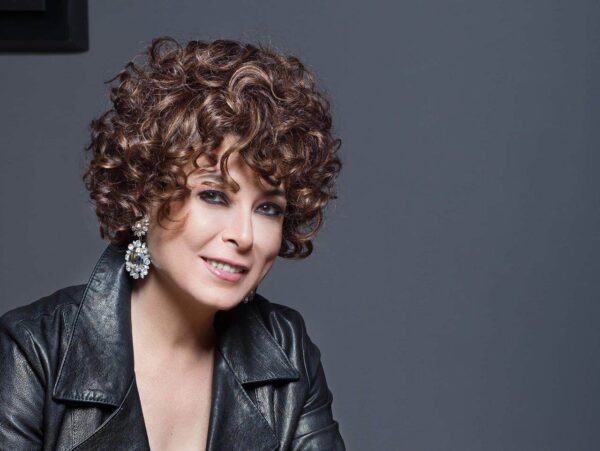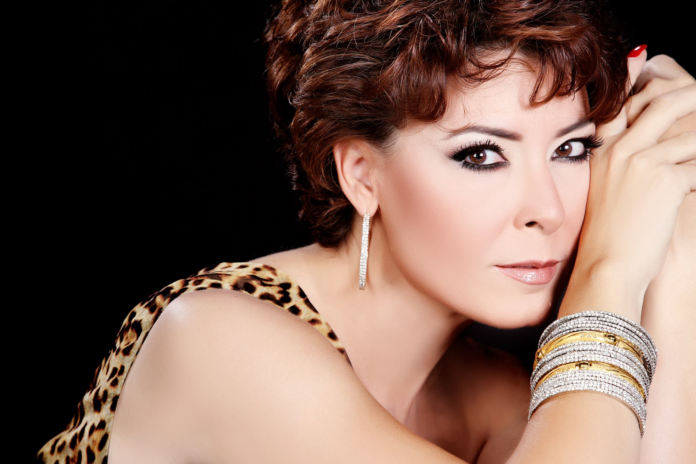CAIRO — My friends, Haig Avakian and Martiros Palaian, hosted me last November in Cairo, allowing me to realize my wish to interview one of the Armenian stars of Egyptian showbusiness. Thanks to their efforts, I met Anoushka, a famous singer, actress and TV presenter in Egypt. Our meeting with this charming, charismatic star took place in Hilton Hotel of Cairo. I was fascinated by Anoushka’s fluent Western Armenian.
Born Vartanoushe Tchaderdjian, she was born in Heliopolis, studied at the Armenian Kaloustian School in Cairo and studied business administration at the American University of Cairo. After graduating, Anoushka worked at the Tarek Nour advertising firm as a singer of jingles. In the late 1980s, she participated in international festivals in Finland, Czechoslovakia, Bulgaria, Turkey, France and Latin America. She took third prize with her song Habbytak in Turkey and the first prize in 1994, in the Francophonie competitions in France with her own composition, Ya Habibi (Oh my Love) in French and Ya Leyl (Oh Night) also in French composed by Midhat el Khawla. Anoushka also took part in many national, pan-Arab and international music events. She had the lead role in an operetta entitled “El Ward we Fosoulu” in the Children Day festivities. Anoushka is also a prolific actress. In 1991 the prominent Egyptian film director Salah Abu Seif chose her to participate in his movie “Al-Sayed Kaf.” Since then, Anoushka has acted in numerous films and TV serials, as well as in theater and radio.
Anoushka, how did it happen that after studying business administration you became a famous singer?
I took my artistic steps in kindergarten. When I was four or five years old, I would stand in front of the mirror, hold the comb as if it were a microphone and sing. My big dream was to be an artist, to sing, act and dance. There was an atmosphere of artistry inside our Armenian community, in Kaloustian National College or in the Armenian clubs, “Ararat” or “Homenetmen.” My parents always supported my artistic involvements, especially my father. Mama would always say that her daughter should be the first one in the class, while Papa would say that she should be the second or the third one, but to be in the arts. I wanted to enter a conservatory, but I entered the American University because my father was saying: “It is my duty as a father to take accomplished your studies: you must have your certificate in hand, hang it in the house, but after that you are free to do whatever you want.” And it happened that way. As soon as I entered the university, I met someone who was writing TV commercials for the largest advertising company in Egypt. I joined the Tarek Nur advertising agency with the idea that after my classes I could sing from five to six. I sang a number of commercials for six years, my voice was heard on television, but my face was not seen because I was afraid of my father. One day, sitting next to my father, I heard my singing in a TV commercial, and dad said: “Look, this voice sounds like yours!” I said that actually it is me singing. My father, seeing that there was nothing shameful in it, said with a smile: “Hey, Anoushka, you will not do anything wrong!” (laughs). And I started to take my steps toward singing.

And was it okay from the side of the Egyptian show business?
When I was singing commercials for six years, people in showbusiness would talk about me. At the same time, I started sending my songs to festivals. There was a company that wanted me to sing international songs in Arabic. but I said I would like to sing my own songs. This stubbornness of mine got me to a good place. I said, I don’t want money from anyone, I have to work my own. I started to record songs for 19,000 Egyptian pounds, a huge amount in 1988, especially for someone who had barely started working. I was earning already and, on my birthdays, I would always ask for money instead of presents, which I would invest in my songs. Soon I got partners in my work, who were also investing with me. Thus, God helped me. I entered a milieu, knowing very few people, on the other side, the taste for Arab songs and music is very different from our Armenian taste. The only person who was able to help and be a support for me was composer and choirmaster Haig Sarkisian. I was one of the soloists, the first soprano of his Groong choir. We sang for eight or nine years, we had a concert every year, we traveled here and there, we went to Syria. Our artistic characters were shaped and polished by the Groong choir. My presence in the choir was more professional, and Haig helped me professionally, but up to a certain point. Our qualities were also revealed in the Armenian dance groups. I cannot forget our Zangezur dance group coach Eleonora Grikourova, an Armenian choreographer from USSR.










